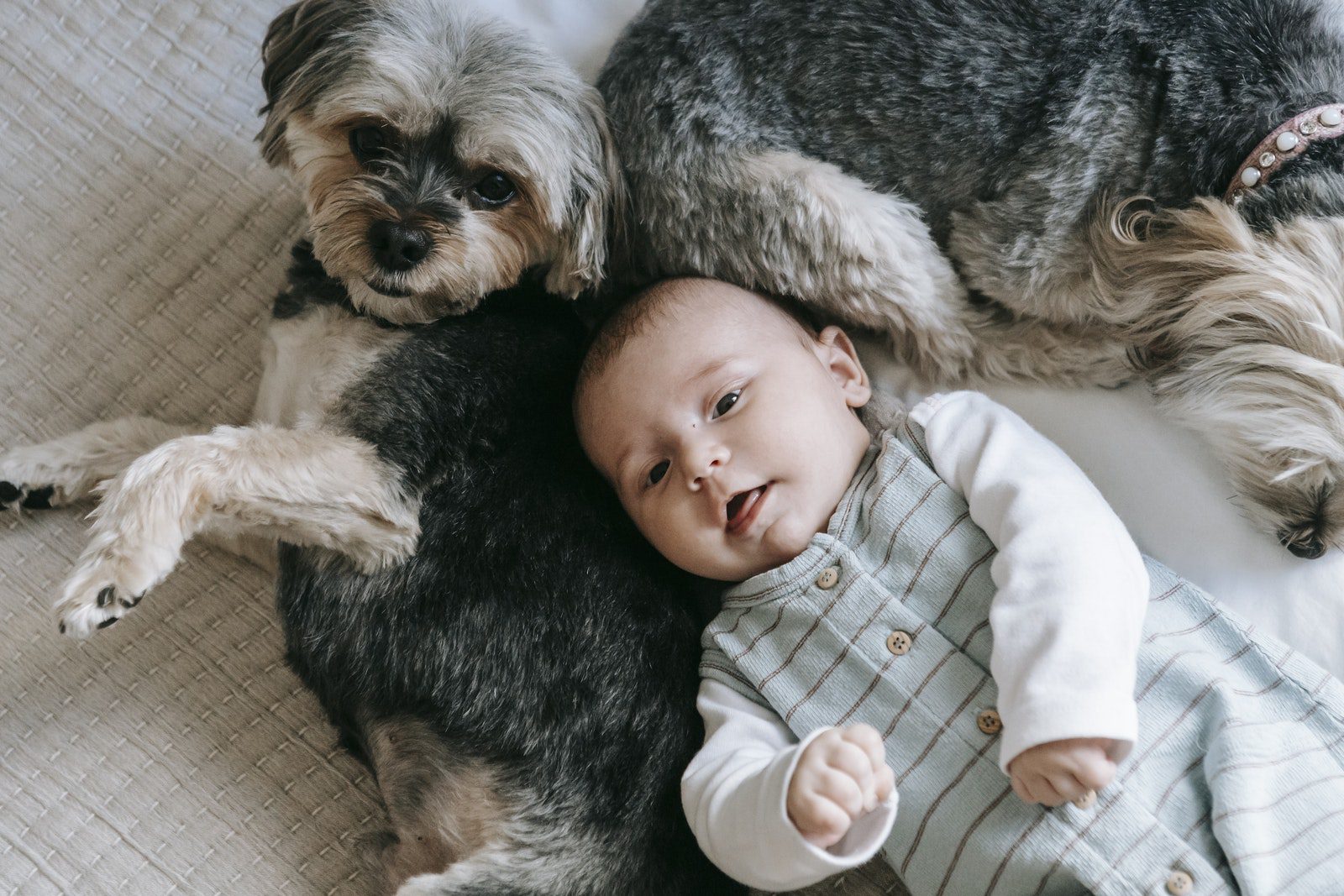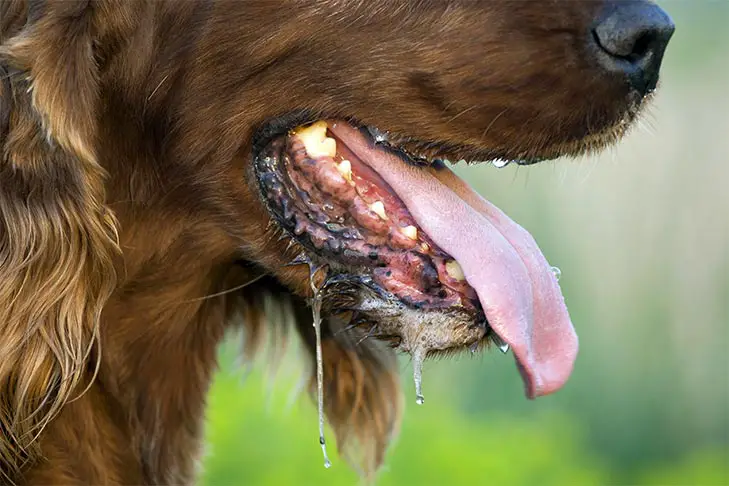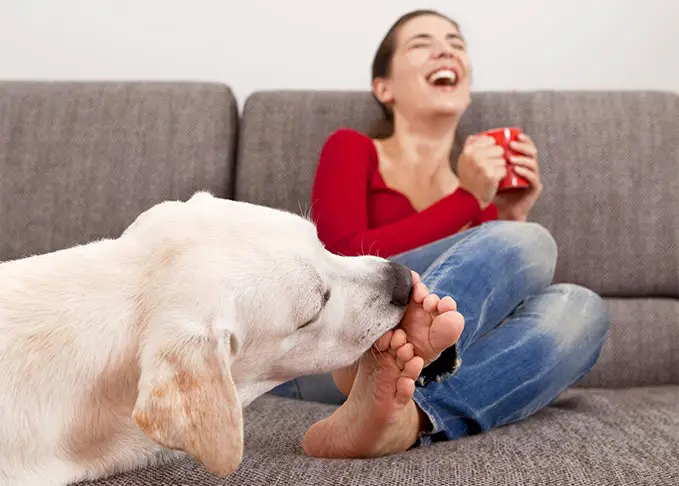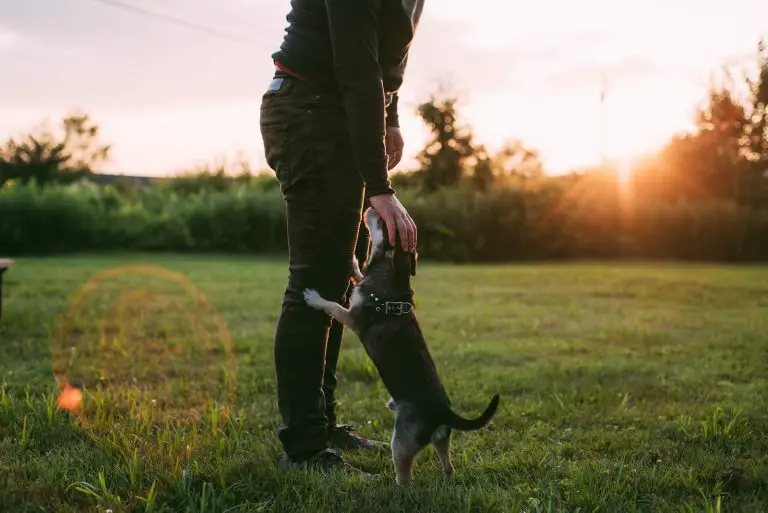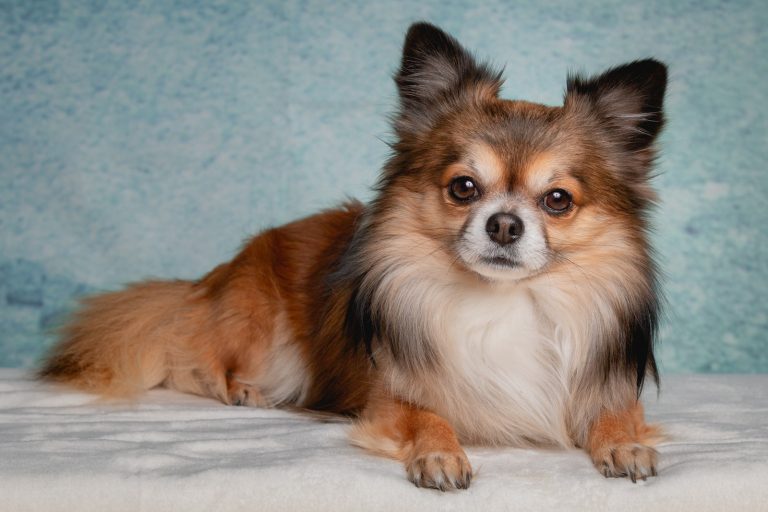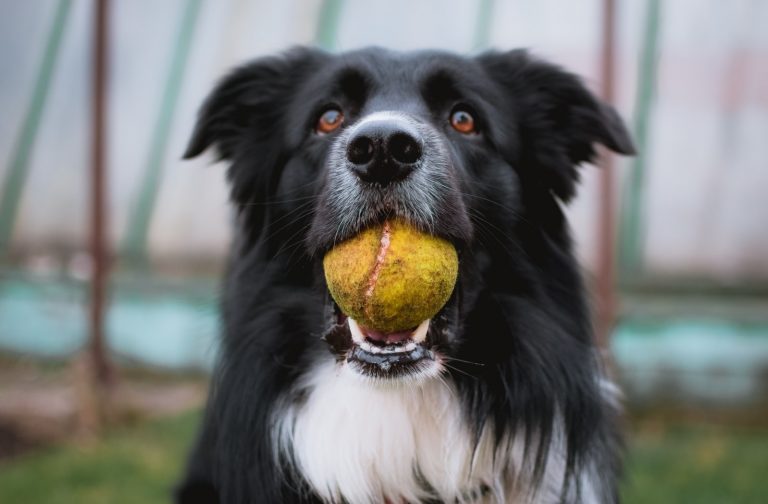Dogs naturally become a part of the family, and their humans become their “pack.” They make especially great companions for the smallest members of the family.
There are hundreds of ways your dog can make a great babysitter–from protecting your baby to teaching your baby to crawl. Here are 40 reasons why dogs make the best babysitters.
There’s a lot of science and first-hand experience below, but we also wrapped everything up into an infographic for fun. So, check it out.
Historically, many dog breeds were known for their babysitting abilities. Pit Bulls, German Shepherds, Rottweilers, and Dobermans were all known as “nanny breeds” at one time or another.
Many dog breeds make for inherently good babysitters: Pit Bulls are one of the most tolerant and temperamentally easy-going breeds, second only to Golden Retrievers. This makes sense since dogs were most likely the first species that humans domesticated.
Recent studies showed that, of all species, dogs share the most psychological characteristics with humans, even more than other primate species. This means that they lived with humans and have therefore been immersed in human life and behavior for tens of thousands of years.
In this way, it makes perfect sense that dogs would demonstrate the same caring and nurturing characteristics with children that humans do.
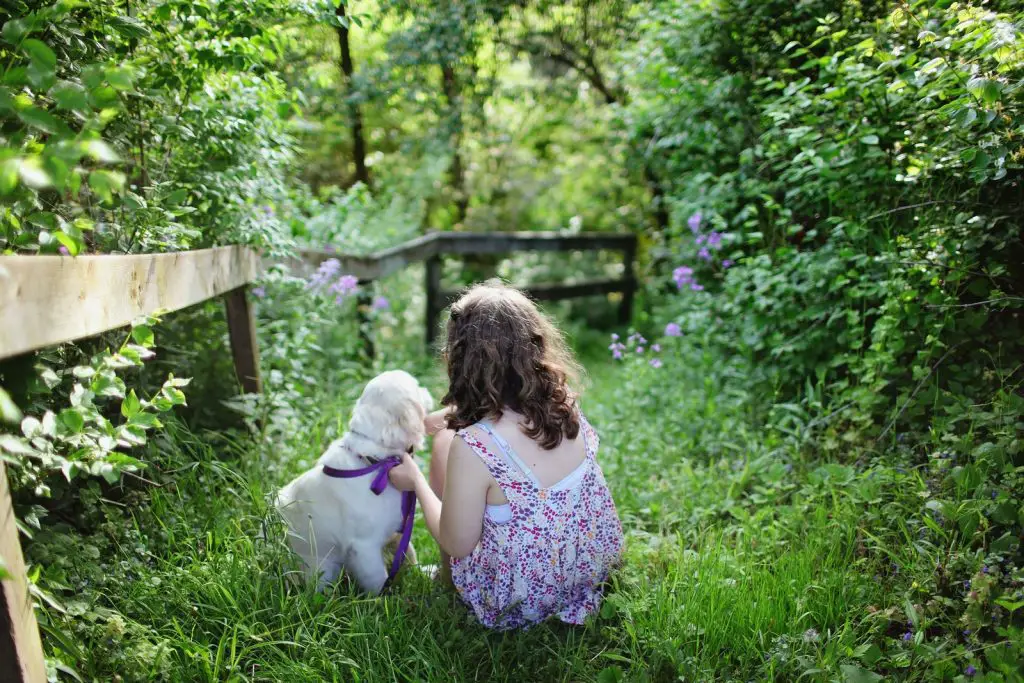
As animal expert Karen Winegar states, “The human-animal bond bypasses the intellect and goes straight to the heart and emotions and nurtures us in ways that nothing else can.”
It is scientifically proven that dogs make humans of all ages happier. When children are allowed to pet and cuddle with a dog, their levels of oxytocin—also known as the “love hormone”—increase, enhancing feelings of trust and relaxation.
Petting dogs also decreases children’s cortisol, or “stress hormone,” levels. The process of petting a dog reduces blood pressure as well. This combination of lower cortisol and lower blood pressure means that the act of petting a dog helps make children feel calm and relaxed.
When a child plays with a dog, their levels of serotonin and dopamine—the chemical building blocks of positive feelings—increase.
As Alexandra Horowitz, who runs the Horowitz Dog Cognition Lab at Barnard College, explains, “Dogs are preternaturally sensitive to changes in their people… If a person is infected with a virus or bacteria, they will smell different.”
So don’t worry if you catch your dog sniffing your baby. While you only have 6 million olfactory receptors, your dog can have up to 300 million, so they might be sniffing out crucial information about your baby that you cannot, including infections.
Many dogs even can tell just from a diabetic child’s sweat or breath if their blood sugar has reached a dangerous level even faster than a glucose monitor can.
If a dog senses something is wrong with your baby, they might make an extra effort to stay close to your baby at all times or keep other people away from your baby.
Maybe it’s because dogs and babies share so many common interests that dogs are often able to stop babies from crying!
Dogs will often make loud sounds, create distractions, and lick babies to get them to stop crying.
Perhaps dogs can interpret babies’ emotions in a unique way, or possibly, like any loving guardian, they can’t stand to see their beloved baby cry.
Some dogs will even go so far as to sing to get a baby to stop crying!
Dogs will never abandon your kids. They are quick to offer company to your child no matter where your child might be. Whether your child is on the bed, or the couch, or watching TV or playing with his or her toys, dogs will quickly join him or her and be the proverbial partner in crime.
It may be hard for adults to give company to babies at any given time. But that is not the case for dogs. Wherever your child might be, dogs are there next to him or her.
The fact that dogs can make babies physically and mentally calmer also means that they’re great companions for nap time. If your baby is fussy, some time with your pup can help soothe them back to sleep.
It is well known that dogs also sleep 12-14 hours a day, so they’re likely to snooze alongside your baby and keep them company during nap time as well. Thanks to nanny cams we can see how helpful dogs can be for nap time:
Having a dog to nap alongside your baby is like having a monitor in the nursery. They can alert you if your baby is up, or perhaps get your baby back to sleep themselves.
Children need their rest, and dogs are happy to be used as pillows! Even better, they often follow children around and keep them company, so wherever your child goes, your dog can provide a pillow maybe even better than a pad!
Dogs are warm, soft, loyal, and full of love, which makes them the perfect cuddling companion for kids. And since your dog is probably at your baby’s heels, you won’t hear crying when your baby gets sleepy. They will always have their dog to cuddle with, and nap on, and dogs are willing to sleep anywhere, be it a bed, couch, or floor.
Because your baby’s brain is growing and making new connections, it’s essential to give them lots of stimuli, even when it comes to facial expressions. Dogs can be a great help in this department because they can make the funniest faces:
Dogs can make babies happy with funny faces the same way that humans making funny faces can intrigue and delight a baby. The best part is that dogs make faces that are funny to humans all the time without even trying! Your pup’s facial expressions can fascinate your baby, helping to stimulate their developing brain.
Every little kid dreams of having a pony to ride. Why not fulfill their dreams by letting them take a piggyback ride on the back of their four-legged best friend?
To the smallest of the family, a dog can seem as big as a horse, and many dogs tower over little kids!
Dogs are willing and eager to give babies piggyback rides, and it’s an entertaining activity for both the baby and the dog!
Your dog will even kneel to let your kiddo on for a ride. Moms’ and dads’ backs deserve a break from piggyback rides, and the family dog is happy to provide transportation!
Because babies give endless attention, are unpredictable, often have food, and, most importantly, are so easy to love, dogs follow them around endlessly. Your furry friend makes for the best babysitter because they will never take eyes off your baby!
Every parent wants to know where their child is and what they are doing at every moment, and dogs are on top of that. They supervise babies with more focus and fascination than any babysitter ever could.
Dogs never miss when a baby decides to venture off; your dog will always be at your baby’s heels, ready to offer protection.
Consistency is vital in making children feel safe and grounded, and they can always count on man’s best friend. When kids are experiencing lots of changes in their life that are hard to deal with (going to a new school, getting a sibling, moving houses, etc.), they always look for counting on their pup.
Or when they’re just having a bad day, knowing that they still have a furry friend at home—one that will always come when called to give them love and will attend, who is there to care for and protect them—is comforting.
Babies love to pull the tail, hair, nose, cheeks, and ears of your dog. But dogs do not complain. They have a high tolerance for pain and allow babies to play with their bodies. Dogs know that a baby is just exploring his or her world, so they do not mind when a baby subjects them to a bit of physical pain.
Even if your baby or your child accidentally or intentionally step on dogs tail, dogs don’t overreact with pain or agony. They know that the child is innocent and can make a few honest mistakes.
Patience is a virtue, and dogs practice that virtue quite well. Dogs are incredibly patient with babies and know that babies learn slowly. They sit and wait patiently as a baby crawls to them or away from them. They listen to a baby patiently as a baby makes various sounds or giggle, watch quietly when a baby is fed, and calmly look over the baby when he or she is trying to fall asleep.
When it comes to babies, dogs make for the perfect playmate. Not only do they have an endless capacity for amusement and fun, but they can also fetch toys and bring them to your baby!
This will keep your baby, and your pup, happy and amused. Dogs, like babies, love toys, and it’s always more fun to play with toys when you have a friend to play with! Keeping your baby incentivized to play, explore and bond is beneficial both for building their muscles and keeping them mentally stimulated and curious.
Dogs love to instigate gleeful and uncontrollable squeals of laughter from babies. Dr. Addyman of “The Baby Laughter Project” believes that babies laugh in response to learning new information and that changes in that which makes them laugh are a sign of cognitive development changes.
Who better to teach your baby about their surrounding environment than your pup? Dogs love to explore their environment, so they will delight your baby by showing them all the new and beautiful things they can discover.
Crawling is a huge milestone for your baby, and your dog offers crawling lessons for free. Babies can’t start crawling until they’ve learned how to roll, which happens at about 3-5 months.
So don’t be afraid to let your baby spend some time watching your dog roll around! Most babies start crawling at 6-10 months of age, and your pup can be of great help in developing your baby’s muscles and motor skills.
Giving your baby time on their belly helps them to develop their arm, neck, back, and leg muscles. Watching a pup walk around during this “tummy time” may make your baby want to explore too, and observing the way the dog moves can help a baby learn to crawl.
Once your child is old enough, they can start taking care of a dog just as a dog can help take care of them. Feeding, walking, and generally caring for a dog can foster a responsible nature in your child. This can increase feelings of accomplishment and, therefore, confidence in your child.
A child taking care of the dog feels rewarded for being responsible and caring for their pet by the love and affection the dog provides. Furthermore, learning to be accountable for a dog helps teach children to be responsible for themselves as well, so they can become more self-sufficient at a younger age.
Babies make messes. It’s just a fact. But dogs are like a vacuum cleaner that follows your little one around, cleaning up scraps and crumbs.
Why worry about following your baby around the house with a broom when you could let your four-legged friend take care of the cleaning?
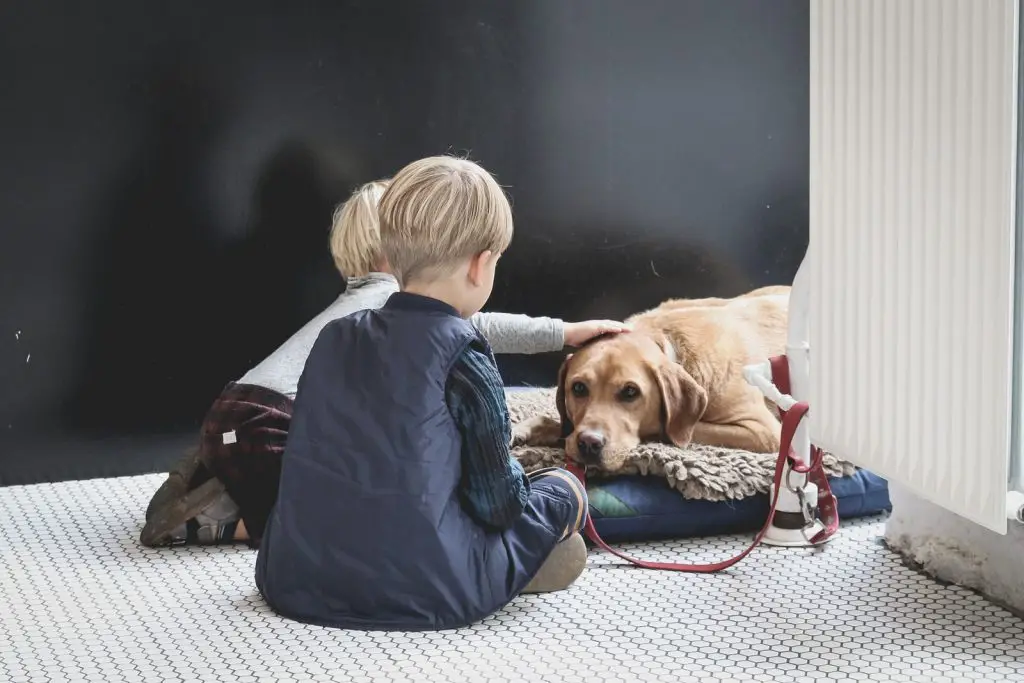
A dog’s sense of smell is stronger than a human’s, so dogs can sniff out crumbs you might not have even noticed.
It’s a good thing your dog follows your baby around everywhere because dogs are always willing to protect this particular little member of their pack, even if it means sacrificing themselves for their baby friend.
Dogs will do anything to keep the babies they love out of harm, whether an accident occurs or there is someone or something dangerous around.
Your baby’s well-being is the most important thing to a dog that has bonded to them, even more important than their safety. Parents can feel at ease, knowing that their baby has a furry friend and protector always around.
Allowing your baby to splash in water will help make them feel more comfortable when they eventually learn to swim in a pool.
Luckily, playing in water is often a dog’s favorite activity, and dogs will happily keep your baby company in a kiddie pool!
It’s vital for babies to feel relaxed when they are first being introduced to water and swimming, and their dog companion can be a great way to keep them feeling calm and at ease.
Babies learning to swim and feel safer when they have something to hold onto, and what better to hold onto than their furry companion? Children can also observe the way their pup swims and might even want to try doggy paddling on their own.
Dogs have also been known to save babies from drowning. Dogs interpret babies as part of their family, and they know when their family is in danger and need help.
The Stafford family of Pontotoc, Mississippi, was lucky to have their rescue dog, Chesapeake Bay retriever named A.C., around when their 17-month-old son Nolan wandered away from the house.
When they rescued their son off the bank of a lake, they realized that their dog A.C. had pulled Nolan out of the water to save his life:
Dogs love the members of who they believe to be their pack, so it’s instinctual to try to save a member of the pack that is in trouble. If there is water around, a dog is a great companion for a child to have; the dog might save their life.
Being imaginative is a crucial part of a child’s mental development, and dogs can be a great help when children use their imagination. If they are pretending to be a superhero, their dog is their sidekick. If they’re a cowboy, their dog is their horse.
Having a canine friend means that children take their dogs on their imaginative journeys, and role-playing with their furry friend sparks even more creative thinking. And a dog will never be embarrassed or think a role is beneath them; they’re ready to step into whatever purpose their little human friend needs for their pretend adventures!
Dogs and babies see the world from the same point-of-view. Both babies and dogs are smaller than adults. They are both able to take in information from the world around them, but sometimes they are confused or upset about things they don’t understand.
Neither of them can talk. The fact that both babies and dogs see the world through the same looking glass makes them natural companions, and because they have the same point-of-view, babies and dogs can easily understand each other.
Both of their worlds mainly revolve around eating and sleeping, and their shared interests make them the perfect pair!
Children hate feeling lonely, and dogs love having a pack, so in having a dog, a child also has a loyal, reliable friend. Dogs give children a connection with another being, as well as the feeling of companionship.
In a dog’s mind, the child of the family is in their “pack,” so, through their instinctual behavior, they teach children about camaraderie. This helps teach children that loyalty and attention are essential parts of socializing and forming friendships.
Bonding with and showing love for their four-legged friend will help your child to develop emotionally. They build mutual trust and friendship, which lasts a lifetime.
It doesn’t matter if the baby is the smallest member of the family; dogs are loyal pack members, and if the baby gives them an order, they will obey to make their tiny human friend happy, no matter how strange or repetitive the order may be. Whether it’s sitting, shaking, rolling over, or fetching a toy if your baby gives your dog an order, your dog will abide by it.
This could mean fetching and retrieving a toy twenty times in a row to make your baby laugh, and they’ll continue to have fun long after any parent would get tired of retrieving what their babies throw! Your dog will do anything to make your baby smile how many babysitters can you say that about?
Did we mention that your dog will give your baby endless free kisses? You might wonder what those licks mean. Mother dogs lick their puppies to clean them, so a lick might mean that your dog sees your baby as its baby as well.
Dogs also lick other members of their pack to groom them and bond with them, so a kiss could also mean that your dog sees your baby as a member of your family pack. Don’t worry about germs either; it’s doubtful that a kiss from a pup would cause infection.
Dog saliva is antibacterial, which is why you see dogs often licking the site of the wound when they get hurt. Scientists at the University of Arizona believe the microbes that come from a dog’s stomach can act as probiotics in humans and promote the growth of healthy gut bacteria as a result of the co-evolution between dogs and humans.
These gut bacteria play an essential role in both our physical and mental health. So don’t get too worried about germs when it comes to kisses from your pup, they might be improving your health.
Dogs are great listeners and can help children learn to express and cope with their own emotions. It can be intimidating for children to express strong feelings with adults, but a dog is always willing to sit and listen with love and without judgment.
Dogs will patiently listen to your baby as it learns to talk or speak. Even when your child is growing up and needs someone to talk to or to tell a story or to share an experience, your dog will patiently listen to him or her until he or she has said the entire story.
Everyone knows that little kids love having staring contests, but nobody has as much patience as a dog when it comes to and endless sitting-and-staring stand-off.
Dogs are masters at staring. They enjoy having staring contests as much as babies do! Babies are endlessly fascinating to dogs, and dogs are very intriguing to babies, so they are happy to stare at each other and can easily keep one another occupied for long periods with staring contests.
Although it’s natural to want to protect a baby from germs, excessively clean environments can be damaging to the development of a child’s immune system.
Studies show that the presence of dogs in a household can reduce a child’s risk for allergies, as well as possibly lowering a child’s risk for developing asthma. Doctors believe that the microbes pets introduce into a house help babies develop stronger immune systems.
One study in Finland confirmed that children living with dogs were prescribed fewer antibiotics for respiratory infections than children living without pets, and the benefits of living with dogs exceeded the benefits of living with cats.
Children that are prescribed fewer antibiotics are less likely to develop drug-resistance to certain kinds of bacteria, thereby improving their immune system in the long run.
Dogs become extra tolerant and protective of children in their household due to the way they see children as a part of their “pack,” so to speak. Just as we come to see our dogs as part of our families, our dogs come to see their human owners as part of their family, including the children of the house.
Dogs will be extra tolerant and protective of the children they live and bond with, just as we would with our family members. They will instinctively protect members of their pack, especially babies.
In Charleston, South Carolina, a labrador retriever-german shepherd mix named Killian fiercely protected a 7-month-old baby named Finn from an abusive babysitter, and warned Finn’s parents, Benjamin and Holly, about the dangerous sitter. Killian would get in between Khan, the babysitter who is now behind bars, and Finn and exhibit aggressive behaviors towards Khan.
One day, Benjamin and Holly discovered that Khan had been cursing at, slapping, and physically abusing Finn. Even though Finn’s parents had done a thorough background check before hiring Khan, their loyal and protective canine companion ended up being the most protective babysitter imaginable.
Dogs know that babies are part of the family, and family comes first. They put the interests of their families ahead of their self-interests. Whenever your baby is close to achieving its goal, dogs will sacrifice themselves or their interests so that your baby can reach it. Dogs will risk their lives to save your babies life.
Dogs are emotionally intelligent animals who can pick up on several of cues and subtleties. They can tell that a baby is harmless or vulnerable. Dogs help children focus on something besides themselves, as well as pick up on non-verbal cues and think about another being’s needs
Surprisingly, canines can teach children emotional intelligence too. Dogs foster empathy in children, so having a dog can help set your child up for successful interpersonal relationships in the future.
Children with high emotional intelligence are very likely to do well in school, and kindergarten teachers consider it more important than the ability to hold a pencil or read. Psychologist Robert Poresky of Kansas State University found a correlation between having a pet and demonstrating a higher level of empathy.
Chasing a dog around is a great way to teach children that exercise doesn’t have to be boring, and that playing and running around is far more fun than sitting inside watching television.
Dogs need to be outside to go to the bathroom and get the exercise and mental stimulation they need. By letting your child and your dog run on the lawn or have a game of tug of war in the living room, you’re keeping the whole pack will be happy and healthy!
There’s nothing that gets children as excited to play outside as having a four-legged friend to run around with! Too much time spent indoors isn’t good for a child’s physical or mental health.
A dog is a great reason to go outside, soak up some vitamin D, and spend time away from screens. Time spent outdoors is known to improve one’s mood and immune system as well.
Dogs are great companions for outdoor adventures and know how to keep the fun going; if they don’t have a toy to play with, they’ll have just as much fun with a stick!
A dog can be an excellent incentive for your baby to work on walking because they will want to follow their furry friends around!
Babies are curious, and they will want to practice getting faster on two legs so they can come on their four-legged friend’s adventures.
Because dogs can provide a soothing presence for babies, they can aid in making a baby feel safe and calm as they learn to walk.
Dogs are happy to follow babies around as they practice walking on two feet, and often even lend a helping hand.
Babies’ seemingly erratic behavior may throw some people, but dogs can smell what babies are feeling at every moment. Dogs’ noses are so sharp they can detect scents related to your baby’s mood.
Dogs can smell changes in chemo-signals released by the human body in response to emotion. Young babies can’t speak up when something is wrong or explain why they are upset, but their furry friend can smell when they are in a bad mood and can provide comfort.
Dogs also help children learn to express and cope with their own emotions. It can be intimidating for children to express strong feelings with adults, but a dog is always willing to sit and listen with love and without judgment.
Dogs even helped child survivors of Hurricane Sandy and the Sandy Hook shooting overcome their trauma; the children told their story to pets over and over again until they felt a sense of control.
Children feel like they can share anything with their non-judgmental canine friends.
Both dogs and babies need physical bonding, so when your baby touches your dog, the two are forming an emotional bond. Dogs love being touched because it makes them feel secure, and if they are not petted enough, they can fall into a depression.
Babies love to poke and touch and explore everything around them, so many dogs are incredibly tolerant of children’s poking and prodding because they enjoy the attention, stimulation, and emotional bond with their tiny human friend.
For a baby to achieve milestones like rolling and crawling, they need to build their muscles. One way to make sure babies are growing their muscles is by making sure they spend time playing with their arms up.
Having a dog to play with is an excellent incentive for your baby to lift their arms, whether that means getting puppy kisses on their hands or reaching up to pet your pup.
Babies have a natural curiosity, and a dog offers endless reasons for them to stick out their arms and get a little workout in the process!
Developing a sense of humor helps your child build self-esteem, exhibit empathy, cope with stressful situations, and think creatively.
Research shows that laughter lowers blood pressure, improves the immune system, and leads to better circulation, so dogs provide health benefits to babies by making them laugh.
A dog can aid in the development of these skills and help demonstrate to your baby that life is more fun with silliness and a sense of humor!
Babies and dogs are the perfect companions: dogs love physical attention, and babies love to touch everything around them! It is essential for a baby’s development that they touch a variety of textures.
With a dog as a babysitter, babies can learn what wet tongues, fuzzy fur, soft ears, fluffy tails, leathery foot-pads, etc. feel like to touch. Dogs will also bring babies lots of things to touch and feel, like toys, blankets, pillows, whatever they can find!
In this way, dogs provide a great deal of mental stimulation for your baby’s growing and developing brain.
Conclusion
No random babysitter will ever be able to exhibit the same amount of unconditional love for your child as your dog. Plus, dogs are always willing to babysit for free. Babysitting isn’t a “job” for dogs; it’s their duty and part of their life in the family pack.

